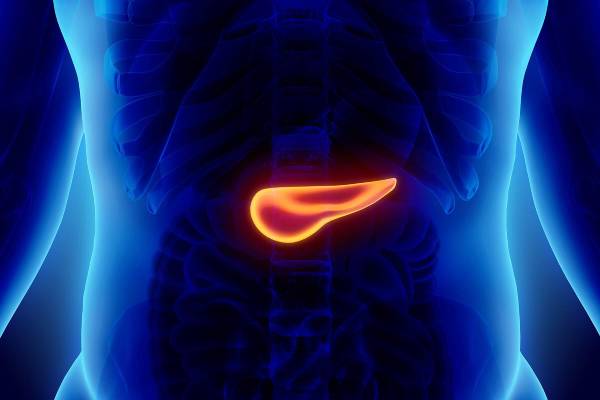Pancreatic Cancer
- Home
- Pancreatic Cancer

Pancreatic cancer is a challenging disease characterized by the abnormal growth of malignant cells in the pancreas. It is often diagnosed at advanced stages, leading to poor prognosis. However, advancements in medical technology and the expertise of Dr. Arun Nair provide hope for effective treatment and improved outcomes for patients with pancreatic cancer.
What is Pancreatic Cancer?
Pancreatic cancer occurs when cells in the pancreas develop genetic mutations, causing uncontrolled cell growth. This can lead to the formation of tumors in the pancreas. The most common type of pancreatic cancer is adenocarcinoma, which affects the cells lining the pancreatic ducts. Less common types include ampullary carcinoma, acinar cell carcinoma, and pancreatic neuroendocrine tumors (PNETs).
Types of Pancreatic Cancer:
Dr. Arun Nair is highly proficient in a diverse range of Pancreatic Cancer, including:
Exocrine Pancreatic Cancer:
- Adenocarcinoma: This type accounts for approximately 90% of pancreatic cancers. It starts in the exocrine cells, which produce digestive enzymes.
- Ampullary Carcinoma: This cancer arises in the ampulla of Vater, where the bile duct and pancreatic duct meet.
- Pancreatic Acinar Cell Carcinoma: This rare cancer begins in the acinar cells of the pancreas, which produce digestive enzymes.
Endocrine Pancreatic Cancer:
- Pancreatic Neuroendocrine Tumors (PNETs): These tumors develop from the hormone-producing cells of the pancreas. They can be functional, secreting hormones, or non-functional.
Benefits of Choosing Dr. Arun Nair for Pancreatic Cancer Treatment:
- Smaller Incisions and Reduced Scarring: The tiny incisions used in laparoscopic surgery result in minimal scarring, promoting improved cosmetic outcomes and reduced post-operative discomfort.
- Less Post-operative Pain and Discomfort: Due to the smaller incisions and reduced tissue trauma, patients typically experience less pain and discomfort following laparoscopic procedures.
- Faster Recovery and Shorter Hospital Stay: The minimally invasive nature of laparoscopic surgery allows for quicker healing and shorter hospitalization, enabling patients to return to their regular activities sooner.
- Reduced Risk of Complications: The smaller incisions and reduced exposure of internal organs minimize the risk of infection, blood loss, and other post-operative complications.
- Quicker Return to Normal Activities and Work: With faster recovery times, patients can resume their daily routines and work more swiftly than after open surgery.
Cost of Pancreatic Cancer:
The cost of laparoscopic surgery can vary depending on the complexity of the procedure, the patient’s medical condition, the choice of hospital, and other factors. Dr. Arun Nair’s team will provide patients with a comprehensive cost estimate during the consultation, taking into account individual needs and circumstances. The staff will also assist patients in understanding any available insurance coverage or financing options.
Why Choose Dr. Arun Nair for Pancreatic Cancer?

Experience and Expertise
Dr. Arun Nair is a highly experienced surgical gastroenterologist with a specialization in pancreatic cancer treatment.

Advanced Techniques
He is skilled in advanced laparoscopic, gastrointestinal, and robotic surgery, allowing for precise and minimally invasive procedures.

International Fellowships
Dr. Nair has undergone specialized training in renowned international institutions, enhancing his knowledge and expertise in pancreatic cancer management.

Multidisciplinary Approach
He collaborates with a team of medical oncologists, radiation oncologists, and other specialists to develop comprehensive treatment plans tailored to each patient's needs.
Book an Appointment
To schedule an appointment with Dr. Arun Nair for pancreatic cancer treatment, please contact the provided appointment phone numbers.
Frequently Asked Questions (FAQ's):
Common symptoms may include abdominal pain, unexplained weight loss, jaundice (yellowing of the skin and eyes), loss of appetite, nausea, and digestive issues.
Diagnosis typically involves a combination of imaging tests, such as CT scans or MRIs, and biopsies to confirm the presence of cancer cells.
Treatment options for pancreatic cancer may include surgery, chemotherapy, radiation therapy, targeted therapy, immunotherapy, and palliative care to manage symptoms and improve quality of life.
The prognosis for pancreatic cancer depends on factors such as the stage of the cancer, overall health of the patient, and individual response to treatment. Early detection and prompt intervention offer better chances of successful outcomes.
The cost of pancreatic cancer treatment can vary depending on factors such as the stage of cancer, specific treatment modalities, hospital charges, and additional supportive care needed. It is advisable to consult with Dr. Arun Nair and the hospital to obtain accurate cost estimates and discuss potential financial assistance options.
Google Review
EXCELLENTTrustindex verifies that the original source of the review is Google. Dr. Arun S. Nair is an exceptional surgeon whose expertise and dedication were evident throughout my father’s treatment. From the very first consultation, he took the time to explain the procedure in detail, addressing all our concerns with patience and clarity. His calm and confident approach reassured us that my father was in the best hands. During the surgery and recovery process, he remained attentive, ensuring everything went smoothly and that my father was comfortable. His professionalism, skill, and genuine concern for his patients make him a truly outstanding doctor. Leena, was equally remarkable. She was always available to answer our questions, provide updates, and offer emotional support. Her warmth and kindness made a huge difference, not just for my father but for our entire family. She treated us with care and respect, making sure we felt heard and supported every step of the way. Together, Dr. Nair and Leena create a team that goes above and beyond for their patients. We are incredibly grateful for their care and would highly recommend them to anyone in need of medical treatment. Susanna Parackal Varghese D/O P T VargheseTrustindex verifies that the original source of the review is Google. We’ve had an amazing experience with Dr. Arun S. Nair. When my dad got sick, I found Arun online and reached out to his assistant. He has been nothing but exceptional in patient care. He did a very long and complicated gastral surgery on my dad and he came out of it perfectly fine. Dr Arun, his associates Dr Aishwarya and Leena are very talented people and great at supporting the patient throughout the process. I was constantly in touch with all of them over the phone and they were very helpful to all of us. If you have any gastric related issues, please always go to Dr Arun.Trustindex verifies that the original source of the review is Google. Good treatmentTrustindex verifies that the original source of the review is Google. Dr. Arun S Nair is a skilled gastro surgeon known for his kindness and politeness towards patients.Trustindex verifies that the original source of the review is Google. I was a surgery patient here. It was nice experience and feeling goodTrustindex verifies that the original source of the review is Google. നല്ലത്Trustindex verifies that the original source of the review is Google. Right after the first consultation with Dr.Arun S Nair I gained confidence to do my hernia surgery and decided to get it done by Dr.Arun S Nair himself. Surgery was successful and I recovered within the time as previously told in the first consultation.Trustindex verifies that the original source of the review is Google. Dr. Arun S Nair totally impressed us during our first meet in February 2023 regarding my mother's surgery. Dr Arun gives courage, confidence and the way he treats patients, maybe beacause of all this I didn't have any tension. He is very friendly with everyone. I'm very satisfied with his approach. Dr. Arun S Nair is one of the best Gastro Surgeon in Kerala.Thanks again to Dr Arun sir . Special thanks goes to sister Rachel for her continuous support and assistance throughout our stay.Trustindex verifies that the original source of the review is Google. I am very satisfied and happy. Dr Arun totally impressed us during our first meet.Very happy with the friendly and compassionate aproach. All the staffs are very supportive. Thank you sir

